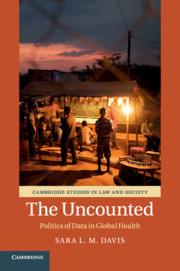4 results
8 - Legal Barriers to Accessing Vital Medical Services and Creative Responses to Overcoming These
-
-
- Book:
- The Rule of Law in the Islamic Republic of Iran
- Published online:
- 10 April 2025
- Print publication:
- 17 April 2025, pp 236-259
-
- Chapter
- Export citation
Chapter 2 - The Uncounted: Key Populations
-
- Book:
- The Uncounted
- Published online:
- 18 May 2020
- Print publication:
- 11 June 2020, pp 45-64
-
- Chapter
- Export citation
Chapter 4 - Cost-Effectiveness and Human Rights
-
- Book:
- The Uncounted
- Published online:
- 18 May 2020
- Print publication:
- 11 June 2020, pp 94-114
-
- Chapter
- Export citation

The Uncounted
- Politics of Data in Global Health
-
- Published online:
- 18 May 2020
- Print publication:
- 11 June 2020

